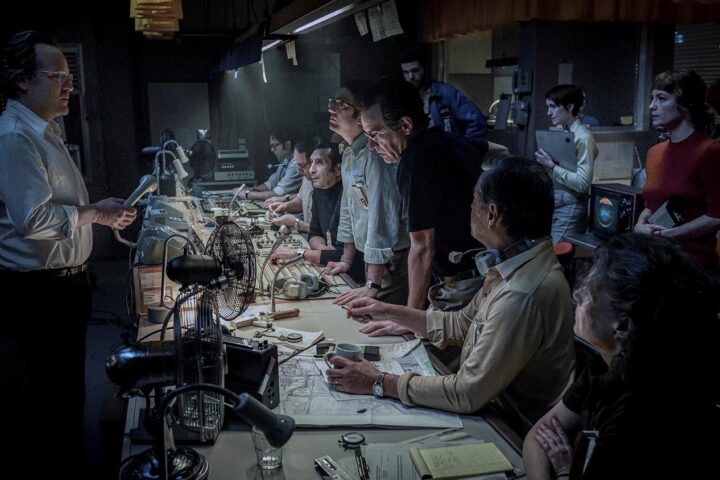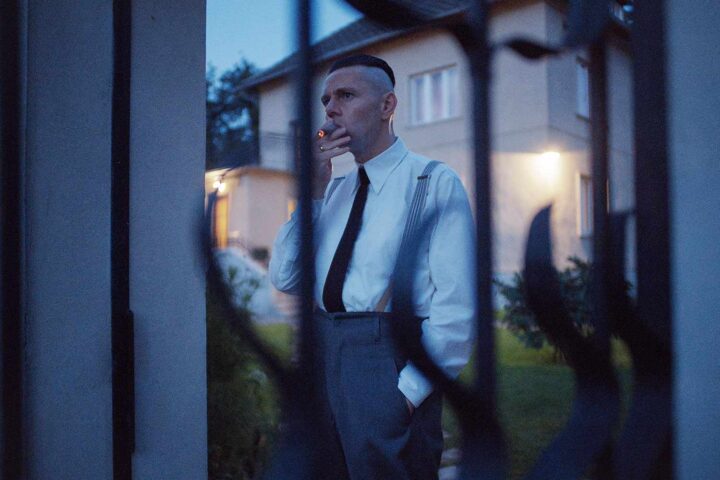Michel Franco’s particular brand of austere fatalism often hinges on the abrupt punishment of his characters. The Mexican shock auteur’s latest, Memory, certainly begins as if it’s setting audiences up for a similar sucker punch. Sitting sullenly by her lonesome at her high school reunion, Sylvia (Jessica Chastain), a social worker and single mother, is approached by Saul (Peter Sarsgaard), who had been eyeing her intently from across the room. At this, Sylvia hastily gets up and leaves, only for Saul to follow her all the way to her home. It’s a journey that Franco’s camera tracks in an unsettlingly placid manner. With little-to-no knowledge of who these two people are, we await the worst to happen.
When Sylvia wakes up the next morning to find Saul outside her Sunset Park apartment in a confused haze after sleeping on the rain-soaked sidewalk, Memory begins to clear up some of the mystery around the previous night’s events. Saul suffers from early-onset dementia and has no idea of how he ended up in front of Sylvia’s apartment. And when Sylvia goes to check in on the mild-mannered Saul a few days later, back at the tony Brooklyn brownstone where he lives under the care of his brother, Isaac (Josh Charles), we discover why she was so apprehensive of him back at the reunion. Sylvia alleges that Saul is one of the men who sexually assaulted her when they were teenagers, something that he claims to have no recollection of.
This is the kind of incendiary subject matter that Franco is known for, and Memory’s scenario sets up a few thorny and timely questions. Chiefly, is it possible for Sylvia to extend forgiveness toward someone who can’t actually remember his past crimes? At the same time, could Saul be conveniently using his condition as a cover for his prior misdeeds? And is it wrong to speculate about the motivations of a mentally ill man, even if he’s a monster underneath?
But before there’s any space to ponder these scenarios, Memory swiftly pivots away from them entirely. Through some quick research, Sylvia finds out that Saul is in fact not the person who she thinks he is, as their respective times in high school didn’t overlap. From here, the film reveals itself as a prototypical yet surprisingly tender love story between two damaged people re-learning how to move through a world that’s unable to adequately support them.
It’s a little jarring to see Franco, a self-styled enfant terrible responsible for such provocations as Daniel & Ana and New Order, flirt with dramatic conventionality in Memory more than he ever has before. Sylvia begins to work as a part-time caretaker for Saul, who’s prone to wandering out of the house and getting lost. The two find comfort in their respective difficulties and eventually a full-blown romance develops between them, which is naturally looked down upon by their families, whose default mode is to treat Sylvia and Saul like irresponsible children.
There are a few notes of Franco’s trademark unease sprinkled throughout, namely in the way the film doesn’t completely erase the lingering doubt about Saul’s intentions, which ends up coloring how we look at both his relationship to Sylvia and his initial interactions with her pre-teen daughter, Anna (Brooke Timer). But Franco mostly plays this aspect of the story as a straightforward budding romance, and one that bears the markings of any number of outmoded melodramas where mental illness and trauma function primarily as plot devices.
But you may not even notice that given Memory’s fine lead performances. Chastain, who communicates the distance between Sylvia and others with a striking poignancy, suggests the abyss within her character through nothing more than a simple look, while Sarsgaard nails the tricky job of portraying Saul’s struggles in a manner that skirts caricature. As their characters come closer together, the two actors allow us to sincerely invest in how the yin-and-yang nature of this duo—that is, how Sylvia is burdened with too many memories, while Saul desperately holds on to the few he has left—could just make them perfect for one another.
When it’s revealed that certain instances of Sylvia’s past sexual abuse occurred closer to home, Memory’s disquieting narrative elements resurface through Jessica Harper’s expertly measured performance as Sylvia’s mother, Samantha. Harper, in a show of unrelenting needling and displeasure, lays bare how the affluent Samantha’s steadfast denial of her daughter’s truth continues to send shock waves of trauma through the lives of her family members, including Sylvia’s ostensibly well-adjusted sister, Olivia (Merritt Wever). While subtly unmasking the chilling cognitive dissonance necessary for Samantha to preserve her idea of the perfect genteel existence, Franco’s signature criticisms of the upper classes come out in perhaps as forceful a manner as they ever have. Who needs shock tactics when the horror is hiding in plain sight?
Since 2001, we've brought you uncompromising, candid takes on the world of film, music, television, video games, theater, and more. Independently owned and operated publications like Slant have been hit hard in recent years, but we’re committed to keeping our content free and accessible—meaning no paywalls or fees.
If you like what we do, please consider subscribing to our Patreon or making a donation.






